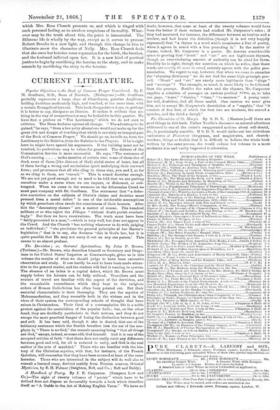The Dervishes ; or, Oriental Spiritualism. By John P. Brown.
(Triibner.)—Mr. Brown, who describes himself as Secretary and Drago- man to the United States' Legation at Constantinople, gives us in this volume the results of what wo should judge to have been extensive observation and study. It can hardly be said to have been made attrac- tive to the general reader, and the student will find it wanting in system. The absence of an index is a capital defect, which Mr. Brown must supply before his labours can be fully utilized. Travellers and the readers of travel are familiar with the aspect of the dervishes, and the remarkable resemblance which they bear to the religious orders of Roman Catholicism has often been pointed out. But their essential characteristic is their theosophy. They are the mystics of Mohammedanism, and they resemble both in the virtues and in the vices of their system the corresponding schools of thought that have arisen in Christendom. Their ideal of a contemplative life is a noble protest against the materialism of the popular faith ; bat, on the other hand, they are decidedly pantheistic in their notions, and they do not escape the more practical danger of losing the distinction between good and evil. It has been said, though it also is denied, that one of the initiatory sentences which the Sheikh breathes into the ear of the neo- phyte is, "There is no God," the esoteric meaning being " that all things are God," except, indeed, as some add, God himself. And it is one of the accepted articles of faith " that there does not really exist any difference between good and evil, for all is reduced to unity, and God is the real author of the acts of mankind." Those who are familiar with the his- tory of the Christian mystics, with that, for instance, of the French Quietists, will remember that they have been accused at least of the same heresies. Those who are interested in the subject will do well also to consult a learned essay, derived mainly from Persian sources, Oriental Mysticism, by E. H. Palmer (Delghten, Bell, and Co. ; Bell and Daldy).






































 Previous page
Previous page